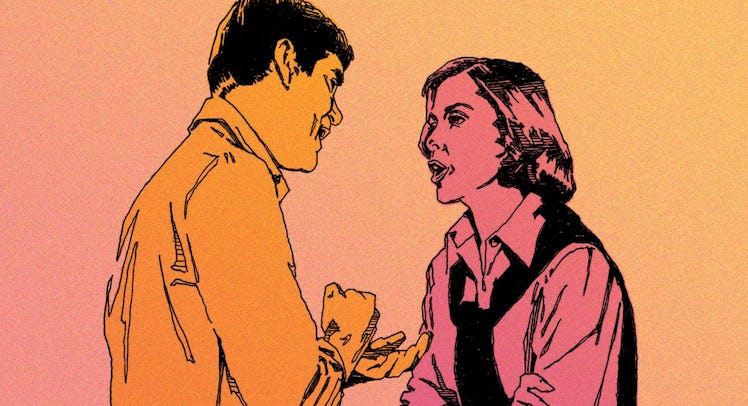The Key to Overcoming Those Inevitable Rough Patches in Marriage
Daphne de Marneffe, author of the new book 'The Rough Patch', discusses the speed bumps that stall marriage during mid-life and what to do to clear the path.

Anyone can get married. Recent numbers show that approximately 6,200 people in the United States alone take the vows every day. So, yeah, getting hitched is a breeze. Staying that way, on the other hand, can take a lot more work.
Every marriage occasionally hits a rough patch, something that sets things slightly off-balance. It can be money issues, in-law problems, or even stress over raising the kids. The rough patch itself isn’t necessarily the issue. It’s how a couple navigates their way through it that can either make or break a marriage. It’s a matter of identifying the rough patches and, hopefully, finding a way through that’s as painless as possible.
“In 2018, in many couples, both people have jobs, both people have a big role in child rearing, both people are managing the logistics of the household,” says psychologist Dr. Daphne de Marneffe, Ph.D., whose new book, The Rough Patch: Marriage and the Art of Living Together, explores, and offers a framework for avoiding, the speed bumps that stall many relationships. The fact that everyone has multiple roles, de Marneffe adds, means that there are multiple sources of stress. “And the more stress we have, the more likely we are to interact in a more unskillful or insensitive way,” she says. “That stress leads to explosive interactions, misunderstandings, and so forth.”
One key sticking point in many 21st century marriages de Marneffe commonly sees is the use, and overuse of technology. While the benefits of having a small window to the world right in your hand are great, the fact remains that that same window can be used as a means of escape.
“Marriage cannot be a back and forth between, ‘Is it your way or my way?’ It has to be ‘our way.’”
“The most important way that technology is problematic is that it creates an all-purpose distraction and way to check out,” de Marneffe says. “And, when things are not particularly pleasant emotionally, or when they’re complicated or they’re not harmonious, the one go-to people have is to go into their private world, either on their phones or on Facebook or what have you. It’s a move toward kind of a solitary, escapist preoccupation that can be damaging to the relationship.”
Similarly, alcohol use and other addictive behaviors can cause strain on a marriage because a spouse can also use them as a means of avoiding day-to-day stresses. “Like the technology, it’s a way that people relax and check out a bit and it’s basically a way that people handle their emotions and that can either be a subtle problem or a bigger problem and it’s a point of reckoning.”
One of the biggest issues of marital unease is one that is as old, if not older than the institution itself: money. “Money is an across-the-board issue for couples because it really relates to these basic questions of what your dreams are and what the limits are,” she says. “We’re dealing with that throughout life, whether we’re married or not. Especially with kids, because we all have our pasts and the way we grew up and what we want to give our children and that might be different from our spouse and the whole question of how you navigate those values is an ongoing issue and you have to keep talking about it.”
So what is the big key to facing these rough patches and crossing through them successfully? Per de Marneffe, it’s communication and openness, particularly when it comes to hearing your partner’s criticisms and admitting when you’re wrong.
Now, this may seem deceptively simple, but we all know this isn’t always the case. Humans, after all, are stubborn creatures. And to really nail down this communication often requires digging into a big slice of humble pie.
“I just think it’s tragic sitting with a couple in therapy when someone literally is incapable of saying ‘I know I acted badly and I’m sorry.’”
“One of the things that I think is really useful to cultivate in yourself is the ability to take responsibility for your own behavior and apologize,” she says. “I just think it’s tragic sitting with a couple in therapy when someone literally is incapable of saying ‘I know I acted badly and I’m sorry.’”
“It’s not the end of the world to have done something wrong,” she continues. “People often grew up in families where they were humiliated or shamed or blamed if they did something wrong and they have this feeling that it’s a catastrophe to be imperfect or to have done something wrong. But the irony there is, if you can’t admit when you’ve done something wrong, the problems just escalate.”
Dr. de Marneffe notes that oftentimes the rough patches in a marriage will start because one person doesn’t want to hear what the other has to say. Whether it’s the timing of the conversation or the way the other person goes about bringing up the topic, there are just some instances where a spouse isn’t ready or willing to hear it.
“People feel like, ‘I don’t have time to deal with my emotions. My to-do list is a mile long!’” she explains. “Part of the goal of the book is to say, ‘Actually, if you guys can find a way to talk and to share emotion and really listen to each other, that’ll be an engine for harmony and happiness.’ Even if it seems inefficient in the short term, it’ll really serve you in the long term.”
Put simply, she says. “Marriage cannot be a back and forth between, ‘Is it your way or my way?’ It has to be ‘our way.’”
This article was originally published on